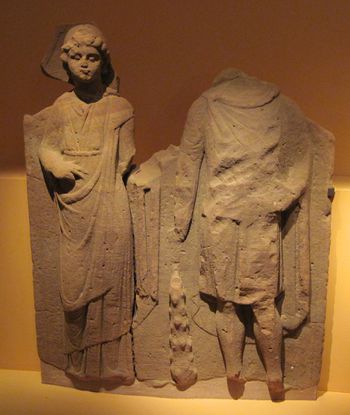「アンカンマ」の版間の差分
| (同じ利用者による、間の16版が非表示) | |||
| 1行目: | 1行目: | ||
[[File:Ancamna MarsSmertrius HistMusPfalz 3477.jpeg|right|thumb|350px|古代ネメテス領のフレッケンフェルトから出土したアンカンマとマールース・スメルトリウスを描いたもの。]] | [[File:Ancamna MarsSmertrius HistMusPfalz 3477.jpeg|right|thumb|350px|古代ネメテス領のフレッケンフェルトから出土したアンカンマとマールース・スメルトリウスを描いたもの。]] | ||
| − | + | ガロ・ローマ時代の信仰では、'''アンカンナ'''(Ancamna)は特にモーゼル川<ref>モーゼル川(モーゼルがわ、ドイツ語:Mosel、フランス語:Moselle - モゼル)は、ヨーロッパのフランス、ルクセンブルクおよびドイツを流れる全長545キロメートルの国際河川である。</ref>の渓谷で崇拝されていた女神である。トリーアとリプスドルフではレヌス・マールスの妃として<ref>H. Finke (1927). "Neue Inschriften," ''Bericht der Römisch-Germanischen Kommission'' 17, inscriptions 12 (= AE:1915|00071), 13 (= EDCS-11201739), 20 (= AE:1915|00070), 254 (= CIL:13|07778).</ref>、メーンではマールス・[[スメルトリオス]]の妃として祭られている<ref>CIL:13|04119.</ref><ref name="Jufer">Nicole Jufer & Thierry Luginbühl. 2001. ''Les dieux gaulois : répertoire des noms de divinités celtiques connus par l'épigraphie, les textes antiques et la toponymie.'' Editions Errance, Paris. pp.14, 21.</ref>。トリアーでは、レヌス・マールス、アンカンナ、トレヴェリの様々なパギ族の精霊神を祀る祭壇が設置され、レヌス・マールスとアンカムナが部族の守護神として公式に編成された教団に祭られているような印象を与えた<ref>Wightman, 1970, page214</ref><ref>Two such surviving inscriptions were published in Finke (1927) "Neue Inschriften," ''Bericht der Römisch-Germanischen Kommission'' 17: inscriptions 12 and 13.</ref>。メーンのマールス・[[スメルトリオス]]とアンカンナの聖域に奉納された数少ない像の中に、トリーアのレヌス・マールス神殿群でクルシギエ神(Xulsigiae)に奉納されたものと同じ、天才ククラトゥス(genius cucullatus<ref group="私注">頭巾を被った精霊神である。天上を曇らす樹木神のことかと思う。シュメール神話のフルップの木、あるいはイラン神話のハオマの木のようなものの擬人化したものか。</ref>)の像が残っている<ref>Wightman, 1970, page224</ref>。 | |
| − | + | また、ルクセンブルク出土のブロンズ製エクス・ヴォートには、レヌス・マールス・ヴェラウドゥヌスと共にインシオナが描かれているようである<ref name="MNHA">Musée d'histoire et d'art, Luxembourg. 1974. ''Pierres sculptées et inscriptions de l'époque romaine'', catalogued by Eugénie Wilhelm, p.71.</ref>が、インシオナとアンカムナの間にどんな関係が存在するのかは、もしあるとしても不明である<ref group="私注">インシオナとは子音からみて、シュメール神話で[[イナンナ]]の侍女であるニンシュブルのことかと思う。</ref>。ジャファーとルギンバッハは、アンカンナをガリアのマールスの他の二人の妃、リタビス(Litavis)とネメトーナ(Nemetona)と結びつけ、いずれも戦士の女神ではなかったと指摘し、代わりにアンカンナが泉と関連していた可能性を示唆している<ref name="Jufer"/>。エディス・ワイトマンは、マールース・ルーセティウス(Mars Loucetius)とネメトーナのカップルを「レヌスとアンカンマと同じではないにしても、よく似ている」と考えている<ref>Wightman, 1970, page219</ref>。 | |
| − | == | + | == 私的解説 == |
| − | + | アンカンマとは名前の子音構成から、ギリシア神話のアルクメーネーに相当するのではないだろうか。またシュメール神話の[[イナンナ]]にも相当するように思う。 | |
| − | == | + | == 参考文献 == |
| − | * Ellis, Peter Berresford (1994). ''Dictionary of Celtic Mythology'' (Oxford Paperback Reference), Oxford University Press, Oxford. | + | * Wikipedia:[https://en.wikipedia.org/wiki/Ancamna Ancamna](最終閲覧日:22-12-11) |
| − | * MacKillop, James (1998). ''Dictionary of Celtic Mythology''. Oxford University Press, Oxford. | + | ** Ellis, Peter Berresford (1994). ''Dictionary of Celtic Mythology'' (Oxford Paperback Reference), Oxford University Press, Oxford. ISBN:0-19-508961-8 |
| − | * | + | ** MacKillop, James (1998). ''Dictionary of Celtic Mythology''. Oxford University Press, Oxford. ISBN:0-19-280120-1. |
| − | * Wood, Juliette (2002). ''The Celts: Life, Myth, and Art.'' Thorsons Publishers. | + | ** Wightman, Edith Mary, 1970, Roman Trier and the Treveri, Rupert Hart-Davis |
| + | ** Wood, Juliette (2002). ''The Celts: Life, Myth, and Art.'' Thorsons Publishers. ISBN:0-00-764059-5 | ||
| − | == | + | == 関連項目 == |
| − | * | + | * イナンナ:シュメール神話でアンカンマに相当する女神か。 |
| + | |||
| + | == 私的注釈 == | ||
| + | <references group="私注"/> | ||
== 参照 == | == 参照 == | ||
| 20行目: | 24行目: | ||
{{DEFAULTSORT:あんかんま}} | {{DEFAULTSORT:あんかんま}} | ||
[[Category:ガリア神話]] | [[Category:ガリア神話]] | ||
| + | [[Category:類熊]] | ||
2022年12月11日 (日) 18:48時点における最新版
ガロ・ローマ時代の信仰では、アンカンナ(Ancamna)は特にモーゼル川[1]の渓谷で崇拝されていた女神である。トリーアとリプスドルフではレヌス・マールスの妃として[2]、メーンではマールス・スメルトリオスの妃として祭られている[3][4]。トリアーでは、レヌス・マールス、アンカンナ、トレヴェリの様々なパギ族の精霊神を祀る祭壇が設置され、レヌス・マールスとアンカムナが部族の守護神として公式に編成された教団に祭られているような印象を与えた[5][6]。メーンのマールス・スメルトリオスとアンカンナの聖域に奉納された数少ない像の中に、トリーアのレヌス・マールス神殿群でクルシギエ神(Xulsigiae)に奉納されたものと同じ、天才ククラトゥス(genius cucullatus[私注 1])の像が残っている[7]。
また、ルクセンブルク出土のブロンズ製エクス・ヴォートには、レヌス・マールス・ヴェラウドゥヌスと共にインシオナが描かれているようである[8]が、インシオナとアンカムナの間にどんな関係が存在するのかは、もしあるとしても不明である[私注 2]。ジャファーとルギンバッハは、アンカンナをガリアのマールスの他の二人の妃、リタビス(Litavis)とネメトーナ(Nemetona)と結びつけ、いずれも戦士の女神ではなかったと指摘し、代わりにアンカンナが泉と関連していた可能性を示唆している[4]。エディス・ワイトマンは、マールース・ルーセティウス(Mars Loucetius)とネメトーナのカップルを「レヌスとアンカンマと同じではないにしても、よく似ている」と考えている[9]。
私的解説[編集]
アンカンマとは名前の子音構成から、ギリシア神話のアルクメーネーに相当するのではないだろうか。またシュメール神話のイナンナにも相当するように思う。
参考文献[編集]
- Wikipedia:Ancamna(最終閲覧日:22-12-11)
- Ellis, Peter Berresford (1994). Dictionary of Celtic Mythology (Oxford Paperback Reference), Oxford University Press, Oxford. ISBN:0-19-508961-8
- MacKillop, James (1998). Dictionary of Celtic Mythology. Oxford University Press, Oxford. ISBN:0-19-280120-1.
- Wightman, Edith Mary, 1970, Roman Trier and the Treveri, Rupert Hart-Davis
- Wood, Juliette (2002). The Celts: Life, Myth, and Art. Thorsons Publishers. ISBN:0-00-764059-5
関連項目[編集]
- イナンナ:シュメール神話でアンカンマに相当する女神か。
私的注釈[編集]
参照[編集]
- ↑ モーゼル川(モーゼルがわ、ドイツ語:Mosel、フランス語:Moselle - モゼル)は、ヨーロッパのフランス、ルクセンブルクおよびドイツを流れる全長545キロメートルの国際河川である。
- ↑ H. Finke (1927). "Neue Inschriften," Bericht der Römisch-Germanischen Kommission 17, inscriptions 12 (= AE:1915|00071), 13 (= EDCS-11201739), 20 (= AE:1915|00070), 254 (= CIL:13|07778).
- ↑ CIL:13|04119.
- ↑ 4.0 4.1 Nicole Jufer & Thierry Luginbühl. 2001. Les dieux gaulois : répertoire des noms de divinités celtiques connus par l'épigraphie, les textes antiques et la toponymie. Editions Errance, Paris. pp.14, 21.
- ↑ Wightman, 1970, page214
- ↑ Two such surviving inscriptions were published in Finke (1927) "Neue Inschriften," Bericht der Römisch-Germanischen Kommission 17: inscriptions 12 and 13.
- ↑ Wightman, 1970, page224
- ↑ Musée d'histoire et d'art, Luxembourg. 1974. Pierres sculptées et inscriptions de l'époque romaine, catalogued by Eugénie Wilhelm, p.71.
- ↑ Wightman, 1970, page219
